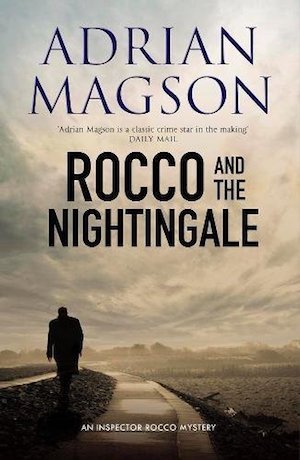Versatile British author Adrian Magson is no stranger to our site. We have interviewed him and reviewed books in which he has ranged widely within the genre, from the action thriller The Watchman to the more sedate but atmospheric historical crime fiction of 1960s France. For long-term fans of Lucas Rocco, the French cop operating in rural Picardie, it has been a long wait for this latest book in the series. It could well give the inspector a new lease of life, as he so richly deserves, and perhaps there will be future Rocco novels too…
A small-time urban criminal is found killed on a country lane in Picardie. It should be a routine investigation, but it turns out that the criminal was on his way to meet an unsuspecting Lucas Rocco to warn him that a bounty has been placed on his head by an Algerian gang leader with a personal grudge.
It’s a grudge that links back to a previous storyline from the series, but before he can investigate matters in greater detail Rocco is pulled off the case and called in to provide protection for a recently deposed government minister from Gabon, who is hiding in France in fear of an assassination attempt. There is some nasty political manoeuvring going on, as Rocco discovers, and all this is not to his taste, but he cannot avoid direct orders.
He decides to do some investigating on the side and discovers that the threat against his life is real. It appears that an elite assassin called The Nightingale is on his trail. Then something happens which proves that there are some strange links connecting the murdered petty criminal and the Gabonese minister. Rocco is an expert at keeping others alive, but can he keep himself alive when he doesn’t quite know where the danger is coming from?
It would seem that he can, given that there are likely to be future novels featuring this character. But don’t worry, this is no spoiler as the denouement is not why you’ll read this novel. The richness and delight of this series lies in the vivid 1960s historical detail and location, the eccentric but relatable neighbours and, of course, Rocco himself. He is a thoughtful and warm-hearted character. There is no unneccessary padding with romance or quarrels with his superiors. These devices aren’t needed to make him seem a three-dimensional character and you get a good sense of Rocco’s values and style without any superfluous detail. He is reliable and duty-driven, and, although he does follow his own path occasionally, it’s not in any overtly rebellious way.
Rocco forms his own opinions about the Ministry of Interior’s nefarious links to corrupt foreign governments, yet he carries on doing his job very professionally. Once again, he relies on local gendarme Claude Lamotte, with his intimate knowledge of hunting in the neighbouring forests, and his ambitious daughter Alix for reinforcements. This time round, however, Rocco also has to use his personal network in Paris to find out more about the possible assassin.
The one weak point in this story is the shift to the killer’s point of view. While initially it brings tension to the plot, it decreases the sense of mystery and makes the ending somewhat predictable. As alluded to, there is an unsolved question at the end that hints at further books in the series.
While Rocco and the Nightingale works well as a standalone, it’s recommend you read the earlier Rocco novels as well for the fullest possible experience of this series. Fans of Andrea Camilleri or Bruno Chef de Police will appreciate the setting and atmosphere.
Dome Press
Print/Kindle/iBook
£3.32
CFL Rating: 4 Stars










